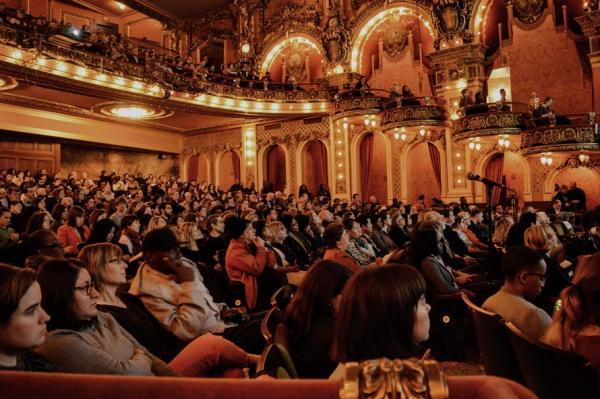November 23, 2016

A capacity crowd at the Cutler Majestic Theatre last Saturday.
Mayor Marty J. Walsh is ready to talk about racism in Boston, a discussion he says has been long avoided but is “the right conversation at the right time” following the “tough” results of the presidential election.
“There’s one of two things that we can do: One is that we can kind of just sit back for the next four years and watch things come apart and be critical on the sideline and see things change, in a bad way,” said Walsh. “Or we can take this election and take strength from it so we continue to bring change to our city.”
An enthusiastic full house of some 1,000 residents gathered at the Cutler Majestic Theatre on Saturday, a large majority agreeing with Walsh’s vow to make the rights and equality of every Bostonian at the top of his agenda, starting with the city’s partnership with the Rockefeller Foundation’s 100 Resilient Cities and the naming of Atyia Martin as Boston’s first Chief Resilience Officer.
“This is a time where our nation is in great transition,” said Walsh. “The office that I hold and the people that are with me, we might have started this conversation, but this conversation is really all of you in this room and the thousands of other people that are dying to have this conversation right now in the city of Boston.”
In addition to Mayor Walsh’s request that residents continue the conversation far beyond the event, attendees also left with “The Blueprint” - a preview to Boston’s Resilience Strategy that’s set to be released in early 2017. The packet details how the city will plan to remove the social barriers that have limited the opportunities for a large number of Bostonians.
“I’ve heard this more than one time: ‘Why are you talking, why don’t you take action? The answer is that change is made possible by people,” said Walsh. “We are taking action. We’re taking action by talking, by sitting down, by understanding.”
While the reaction to Walsh’s words were overwhelmingly positive, residents used the question and answer portion of the event to address areas that they believed needed further clarification.
Two young speakers from the Center for Teen Empowerment provided highlights of the program. Dante Omorogbe, a 20 year-old youth organizer from Dorchester, said his new role has motivated him to “look deeper into the issues” that his community faces.
“From the murder of Emmett Till to the murder of Trayvon Martin, two boys who look like me and did nothing wrong, American society has made it clear to me that racism isn’t just a word, it’s a reality that the color of my skin limits my opportunities, my health, my safety and my right to express myself,” said Omorogbe.
But Omorogbe added that this awareness has also been one of positive self-reflection: “This awareness has helped me to learn the skin I’m in, even though others do not,” he said.
Wilbur Brown, of Grove Hall, said the conversation was a good first step to establishing a “blueprint” for addressing racism in the future. Brown says that while many view the act of discussion as ineffective, he considers it to be “the beginnings of healing.”
“When you start a movement, you can begin with a small snowball and it ends up being a big avalanche,” said Brown.One resident commented on the need for Walsh to adjust his rhetoric when speaking on the topic of racism, requesting to hear his emotions, “as clear as they are” and to hear him explicitly say that Boston has an issue with racism.
Following the comment, Walsh explicitly confirmed, “Boston has an issue with racism.”
Another resident asked that there be a better allocation of resources for people most affected by the issue of racism in Boston. In response, Walsh highlighted two key initiatives that the city currently offers: The Mayor’s Mentoring Movement and My Brother’s Keeper, a program created by President Obama to improve life outcomes for Black and Latino boys and young men.
Topics:


